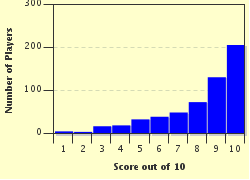Quiz Answer Key and Fun Facts
1. Stephen is first mentioned in Acts 6:5 as one of seven men chosen to be disciples for the Grecian Jews as this group felt their widows were being overlooked in the daily distribution of food by the 12 Hebraic disciples. How is Stephen described?
2. According to Acts 6:6, what happened almost immediately after Stephen and the six other Grecian Jewish disciples were chosen?
3. As per Acts 6:8, Stephen is credited with doing great wonders and miraculous signs among the people.
4. According to Acts 6:9, opposition arose to the early church "from members of the Synagogue of the Freedmen (as it was called) -- Jews of Cyrene and Alexandria as well as the provinces of Cilicia and Asia". What would happen when these men began to argue with Stephen, as per Acts 6:10?
5. According to Acts 6:11, how did the opponents of Stephen and the early church stir up the people, the elders, and the teachers of the law?
6. Acts 6:15 leaves no doubt Stephen was special. When he appeared before the Sanhedrin, what did people see when they looked intently at Stephen?
7. Much of chapter 7 is about Stephen appearing before the Sanhedrin in which he gave a passionate defence for the Gospel of Jesus Christ. But he obviously struck a raw nerve when he said the prophets foretold the coming of Jesus, that they killed those who predicted the coming of the Righteous One and that they had "betrayed and murdered" Christ. Then, according to verse 54, what happened?
8. In Acts 7:55-56, Scripture states Stephen, full of the Holy Spirit, looked up to heaven and saw the glory of God, and Jesus standing at the right hand of God. 'Look,' he said, 'I see heaven open and the Son of Man standing at the right hand of God." Then what happened?
9. According to Acts 7:58 and 8:1, who witnessed and helped with the execution of Stephen?
10. According to Acts 7:59-60, what were the final words of Stephen?
Source: Author
Cowrofl
This quiz was reviewed by FunTrivia editor
CellarDoor before going online.
Any errors found in FunTrivia content are routinely corrected through our feedback system.

